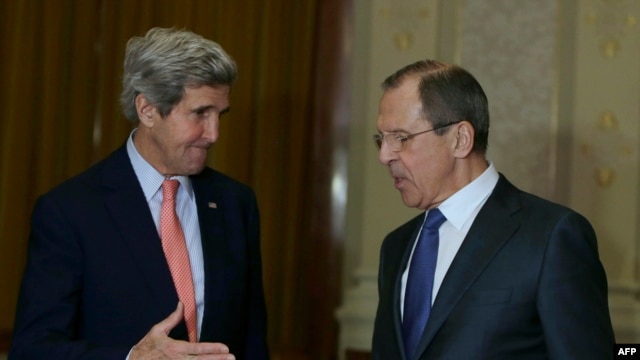U.S. wants evidence Russia ready to ease Ukraine crisis
| Publisher | Radio Free Europe/Radio Liberty |
| Publication Date | 10 March 2014 |
| Cite as | Radio Free Europe/Radio Liberty, U.S. wants evidence Russia ready to ease Ukraine crisis, 10 March 2014, available at: https://www.refworld.org/docid/534d2e7714.html [accessed 21 May 2023] |
| Disclaimer | This is not a UNHCR publication. UNHCR is not responsible for, nor does it necessarily endorse, its content. Any views expressed are solely those of the author or publisher and do not necessarily reflect those of UNHCR, the United Nations or its Member States. |
Last updated (GMT/UTC): 10.03.2014 19:00
 U.S. Secretary of State John Kerry (left) at a January meeting with Russian Foreign Minister Sergei Lavrov
U.S. Secretary of State John Kerry (left) at a January meeting with Russian Foreign Minister Sergei Lavrov
The U.S. State Department says Washington wants to see proof that Russia is prepared to engage seriously on a diplomatic solution to the crisis in Ukraine.
State Department spokeswoman Jen Psaki said that in a telephone conversation on March 8 Secretary of State John Kerry had laid out a number of ideas to his Russian counterpart Sergei Lavrov.
She said Kerry is prepared to take part in further talks only if Russia is ready to engage on these proposals.
"When Secretary Kerry spoke with [Russian] Foreign Minister Lavrov this weekend, he made clear that he would welcome further discussions focused on how to deescalate the crisis in Ukraine – if and when we see concrete evidence that Russia is prepared to engage on these proposals," Psaki said.
The State Department says Kerry told Lavrov that Washington wanted Moscow to cease its military advances in Ukraine, stop its drive to annex Crimea, and end "provocative steps." It said Kerry has yet to receive any response.
Earlier on March 10, Lavrov said that Kerry had asked to postpone a visit later the same day to Moscow, after initially accepting the invitation. At a meeting with Russian President Vladimir Putin in Sochi, Lavrov also said that the proposals made by Kerry "did not really suit us."
"We invited [Kerry] to come [to Moscow], I believe as soon as today when you [Putin] said you were ready to meet him. [Kerry] initially accepted our invitation. Then he called me back on Saturday and said that he wanted to – as he put it – postpone his visit because a new additional paper has been put together in Washington. He forwarded it to me yesterday. We analyzed it and, to be honest, we are raising a lot of questions in this regard."
Lavrov said that Russia has prepared its own proposals to resolve the crisis "taking into account the interests of all Ukrainians."
Russian forces have seized control of Ukraine's Crimea, where Moscow says it has the right to protect its interests and the interests of majority ethnic Russians.
Earlier on March 10, the Russian Foreign Ministry expressed concern at what it termed the "lawlessness" affecting Russians and Russian-speakers in eastern Ukraine.
The ministry blamed extremists – who it said acted in "connivance" with the new authorities in Kyiv.
Ukraine's government and Western leaders accuse Moscow of distorting the facts to justify the deployment of its forces in Crimea.
In a show of support for Ukraine's new government, U.S. President Barack Obama will meet Prime Minister Arseniy Yatsenyuk at the White House on March 12.
Yatsenyuk will address the UN Security Council about the crisis the following day.
The World Bank announced on March 10 that it was prepared to offer $3 billion to Ukraine this year to help it advance reforms and support crucial development projects.
The bank mentioned key priorities of restoring macroeconomic stability, shoring up the country's banks, reforms to the energy sector and "seriously tackling corruption."
UN Secretary-General Ban Ki-moon's spokesman, Stephane Dujarric, meanwhile warned of serious repercussions if the situation was allowed to deteriorate further.
"Recent events in Crimea in particular have only served to deepen the crisis. As tensions and mistrust are growing, I urge all sides to refrain from hasty actions and provocative rhetoric," Dujarric said. "The international community must help the key actors to calm the situation and work toward a durable and fair political solution. A further deterioration of the situation would have serious repercussions for the people of Ukraine, the region and the global community."
Diplomats said the Security Council would meet again behind closed doors to discuss the Ukraine crisis, its fifth meeting on the issue in 10 days.
Based on reporting by AFP, Reuters, Interfax, and RFE/RL
Link to original story on RFE/RL website
